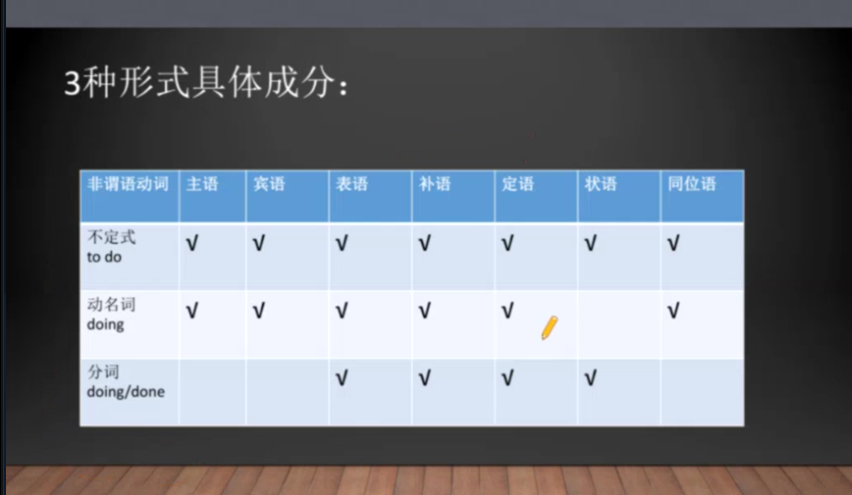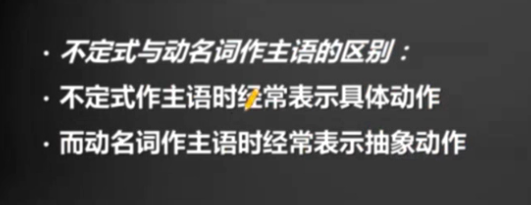
一、做主语

动名词做主语表示抽象动作和习惯性动作。
1.不定式做主语:
(a)To go to school by bus will take me one hour. (这种头比较重)= It will take me one hour to go to school by bus. (较好)
(b)it is adj for sb to do sth. 这里对的adj形容的是事或物(dangerous, difficult, easy, hard, heavy, important, interesting, necessar)。 It is so easy for me to finish the homework by 10.
(c)it is adj of sb to do sth. 这里对的adj形容人的特质(如stupid、rude、selfish、impolite、wise等)。 It is stupid of him to ask this question.
2.动名词做主语:
(a)Studying/Reading can change your future.
Learning English is not hard.
Working for the whole night caused him a cold.
(b)固定用法:It is (no use、no good、no fun、a shame、a waste of time/money、useless、dangerous)+ doing sth.
二、非谓语动词做宾语
1.不定式做宾语
主+谓+不定式。 I want to go home.
这一类谓语有:want、need、decide、plan、hope/wish、expect、agree、attempt、fail、offer、refuse、tend、prepare、demand、pretend、promise.
对于英语来说接不定式的单词多为“打算”“计划”“希望”“将要”等表示未来的动词。
afford 负担得起 / arrange 安排 / ask 要求 / care 想要 / choose 决定 / decide 决定 / demand 要求 / determine 决心 / expect 期待,预计 / help 帮助 / hesitate 犹豫 / hope 希望 / long 渴望 / manage 渴望设法 / offer 主动提出 / plan 计划 / prepare 准备 / pretend 假装 / promise 答应 / refuse 拒绝 / want 想要 / wish 希望.
2.动名词做宾语
(a)主+谓+动名词。 如:i enjoy playing basketball.
这一类的谓语动词有:avoid、finish 、enjoy、consider、practice、Miss、suggest/advise/propose、appreciate、imagine、admit.
admit 承认 / advise 建议 / allow 允许 / appreciate 感激 / avoid 避免 / consider 考虑 / delay 推迟 / deny 否认 / discuss 讨论 / dislike 不喜欢 / enjoy 喜爱 / escape 逃脱 / excuse 原谅 / fancy 设想 / finish 完成 / forbid 禁止 / forgive 原谅 / imagine 想像 / keep 保持 / mention 提及 / mind 介意 / miss 没赶上 / pardon 原谅 / permit 允许 / practise 练习 / prevent 阻止 / prohibit 禁止 / put off 推迟 / report 报告 / risk 冒险 / stop 停止 / suggest 建议 / carry on 继续 / can’t help 禁不住 / feel like 想要 / give up 放弃 / keep on 继续 / put off 推迟 / set about 开始,着手 / object to 反对 / insist on 坚持 / pay attention to 注意 / stick to 坚持 / get down to 开始认真做 / look forwards to 期盼 / be [get] used to 习惯于 / lead to 导致 / be devoted to 致力于,专用于
(b)在介词后边的动名词(介词+n./v-ing/从句)
be used to doing、look forward to doing、object to doing、devote oneself to doing、can't help doing、pay attention to doing、stick to doing. 这里的to是介词,不是不定式.
3.谓语——+不定式和动名词
(a)无区别
start、begin
(b)细微区别
love、like、prefer、hate。 + to do sth.代表具体化的事物; + doing sth. 代表抽象、习惯.
I like to play basketball today. 我今天喜欢打篮球 I like playing basketball. 我喜欢打篮球.(一种习惯)
(c)区别很大
remember、forget、regret。—— +to do sth.(还未做的事); + doing sth. (已经做过的事)
Try —— +to do sth. 努力做某事 ; + doing sth. 尝试做某事
Mean —— +to do sth. 打算做某事 ; + doing sth. 意味着做某事
Stop、Go on —— 如 stop + to do sth. 停下这件事去做另一件事 ; + doing sth. 停下现在做的事
can't help —— + to do sth. 没有办法帮做某事 ; + doing sth. 禁不住做某事.
三、做表语
1.不定式做表语(表示具体化)
My job is to teach English today. (具体某一次)我今天的工作是教英语.
2.动名词做表语(表示习惯性、抽象化)
My job is teaching English. 我的工作是教英语.
3.前后一致(主语、表语/宾语)
To see is to believe. 眼见为实
Seeing is Believing.
What he wants to do the most right now is to travel. 主语从句,谓语前后都用不定式.
四、做宾补
1.不定式做宾补: 主+谓+宾+to do sth. 表示将要做某事。
My mother tells me to come back by 10.
不带to的不定式有四种情况:
a、let, make, have等使役动词后。 let us go.
The boss made the child labors work the whole night. 老板逼迫童工整夜劳作 注意:这些情况在被动语态中,不可省to.
b、would rather, had better后。 You had better stay at home. 你最好呆在家
c、why…/why not…后。 Why not have a happy rest on Sunday?
d、感官动词see, watch, look at, hear, listen to, smell, feel, find,notice 等后作宾语补足语。
例如: I saw her dance.我看到她在舞 除以上四种情况之外,都不得省略to
2.动名词做宾补(用得比较少): 主+谓+宾+doing. 表示正在做某事。
3.done做宾补: 主+谓+宾+done. 表示被动。
I see the computer fixed。 我看到电脑在被修。
4.使役动词的宾补形式
五、哪些可以做宾补(n、adj、adv、介词短语、不定式、动名词、分词)
1. 名词(或代词)+名词
She found him a very clever boy.
2. 名词(或代词)+形容词
He had a strange way of making his class lively and interesting.
3. 名词(或代词)+副词或介词短语
Last Sunday I saw you out with your sister.
To her surprise, she found herself in a different world.
4. 名词(或代词)+分词(分词短语)
I saw him doing his homework when I passed his window.
I was absent-minded when I heard my name called.
注意:
在用现在分词或不定式作宾语补足语的动词中,有些只能用现在分词作宾语补足语;有些只能用不定式作宾语补足语;还有的动词既能用现在分词又可用不定式作宾语补足语:
1)、只能用现在分词作宾语补足语的动词有:catch, keep, mind, prevent, stop(阻止)等。
She caught her son smoking a cigarette.
His words started me thinking.
2)、只能用不定式作宾语补足语的动词有:wish, desire, expect, love, prefer, trust, encourage, let, allow, permit, mean, lead, bring, put, hurry, cause, remind, ask, invite, beg, request, worry, advise, persuade, call on, tell, order, command, require, make, force, drive, forbid, warn, help, teach, show, assist, report, bear, wait for, think, take, know, judge, consider, suppose, believe, allow, prove, declare等。
Their parents don’t allow him to stay out late.
他父母不允许他在外面呆到很晚。
3)、既能用现在分词又可用不定式作宾语补足语的动词有:see, watch, notice, look at, observe, listen to, hear, feel, have, imagine, discover, like, want, understand, hate, get, set, leave等。
She was seen running away from the scene of the crime.
有人看见她从犯罪现场跑开。
I saw you put the key in your pocket.
我见你把钥匙放进了口袋。
六、做定语
1.不定式做后置定语
I have something to tell you. to tell you 修饰something.
Things to be done are all on the list. to be done 修饰 Things.
I want to know something about the meeting to be held next week. = I want to know something about the meeting that will be held next week. 非谓语和从句可以互换.
He is the last one to leave the room. = He is the last one who leaves the room.
2.动名词做前置定语——表示用途
a washing machine
a reading room
smoking section
3.(现在分词、过去分词)分词一般做后置定语——有时间的概念在其中
developing country 发展中国家
developed country 发达国家
Do you know the one (who is) talking to your father? 可以是从句也可以是非谓语做定语,这里是表示正在进行。
The soldier (who is) wounded in that war becomes a doctor.
The question being discussed/ discussed / to be discussed is very important. 正在讨论的/已经讨论过的/将要被讨论的
4.其他词做定语
在英语中可以用作定语的词 有
a、形容词 如 a good student
b、名词 如 a telephone number
c、名词所有格 如 li ming's book
d、数词 如 three books
e、介词短语 如 a map of china
f、不定式 如 give me something to eat
g、 动名词 如 a swimming pool
h、现在分词 如 a swimming child
i、过去分词 如 a boy named tom
j、从句 如 the book that is bought yesterday
k、表方位的副词 如 the people here
七、做状语
不定式做状语
1.表目的(in order to、so as to、to)
We go early (in order)to avoid late.
I come here to see you.
2.原因 (to)
I am happy to see you. 因为看见你,所以开心。
I am honor to be invited.
3.结果(only to、so...as to/such...as to、too.....to、enough...to)
You are so kind as to give me some money.
You are too young to go to school.
分词做状语(主动-doing、被动-done,有先后的话用Having done/been done)
4.时间状语
Invited to make a speech,the boy is very happy. (男孩被邀请,被动)
Having finished eating, the boy rushed out of the room. 吃完饭后,男孩冲出房间.(有先后顺序,用having done)
Having been punished,the student admitted this fault. 受到处罚后,学生承认了自己的错误。有先后顺序,被动,having been done)
5.原因状语
Having been warned,he stoped to doing it. (有先后顺序,被动)
Having been praised, he worked hard.
6.条件状语
Given more time,he can do better.
(if)working hard,you can success.
7.让步状语
8.结果状语
He got home late making his father angry. 他回家很晚,让他的爸爸生气.
Their car was stucked,causing the delay. 他们的车堵了,造成了晚点.
9.方式状语
They eat by/with their hands.
He makes a living by traveling.
10.伴随状语
They stand here, watching the game.
He comes,following by his son.